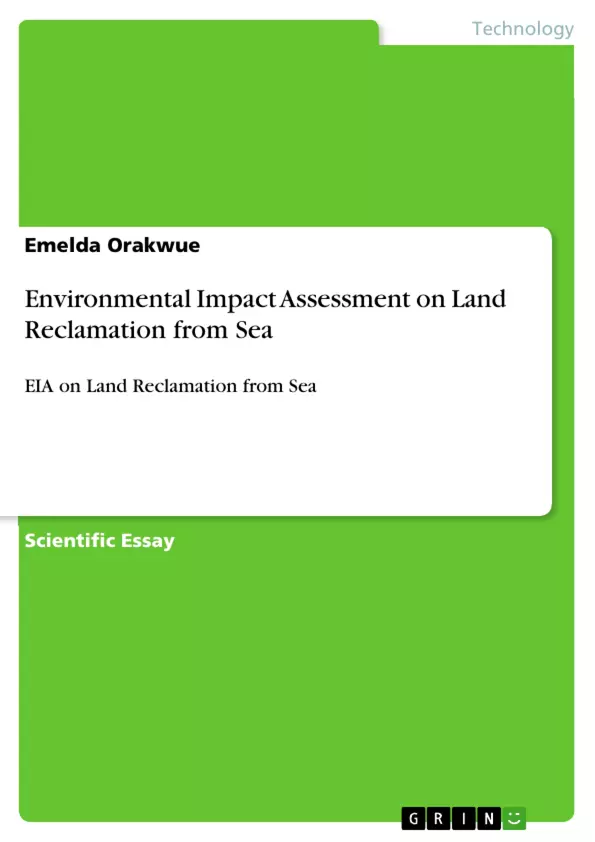Protection against flooding and creating deep access to maritime sea routes was the basic requirement for creating prosperity. In the course of many centuries, hydraulic engineering, dredging technology and land reclamation have emerged as means for creating water-bound prosperity and economic development (DEME, 2013). Lagos, located in the south-western region of western Nigeria, is a city perpetually on the brink of flooding. Bounded in the South by the Atlantic Ocean, the city is situated on the mainland, home to 70% of the city’s population with series of islands and a peninsula that holds the remaining 30% (Ogunlesi, 2012).
The pressures of overpopulation, the growth of industry and the need for protection of the environment were the driving forces behind the project to conquer land from the sea. Although Lagos state is the smallest state in Nigeria, with an area of 356,861 hectares of which 75,755 hectares are wetlands, yet it has the highest population. The rate of population growth is about 600,000 per annum with a population density of about 4,193 persons per sq. km (Lagos State Government, 2013).
In 2008, the Nigerian government commissioned the Shoreline Protection Project, which involved the construction of a 7km long mass of rocks, topped by 5 ton concrete blocks that will rise 9m above sea level. The dam will protect Eko Atlantic City, the massive new $6 billion infrastructure and real estate development (Ogunlesi, 2012). Still 2008 Lagos State Government and South Energyx launched the plan to build a 21st-century city on reclaimed land from the Atlantic Ocean.
The main goal for this EIA report is to conduct and provide a detailed document on the Environmental Impact Assessment (EIA) of land reclamation from Atlantic Ocean for decision making and impacts identification on the environment, despite the project has already commenced. This could be achieved through (1) identifying the project impacts and proposing mitigation measures, (2) provision of alternative measures and (3) check for project feasibility.
Inhaltsverzeichnis (Table of Contents)
- Introduction
- Project site (including map and pictures)
- Project Summary
- Objectives of EIA study for the project
- EIA policy in Nigeria
- Collection of information
- Impacts Category
- Impacts analysis
- Conclusion
Zielsetzung und Themenschwerpunkte (Objectives and Key Themes)
This EIA report aims to conduct a comprehensive analysis of the environmental impacts associated with the Eko Atlantic City land reclamation project in Lagos, Nigeria. The report aims to identify both positive and negative impacts, propose mitigation measures, and examine the project's feasibility.- Environmental Impact Assessment (EIA) of land reclamation
- Mitigation measures for minimizing negative impacts
- Sustainable development and feasibility of the project
- Analysis of social and cultural impacts
- Economic benefits and potential challenges of the project
Zusammenfassung der Kapitel (Chapter Summaries)
- Introduction: This section provides a general overview of the Eko Atlantic City project, its goals, and the rationale behind the land reclamation initiative. It outlines the project's scope, including the size of the reclaimed land, the construction of a dam, and the projected population of the new city.
- Objectives of EIA study for the project: This section details the objectives of the EIA study. It outlines the methodology used for assessing environmental impacts, including identifying potential risks, proposing mitigation strategies, and preparing an environmental monitoring plan. It also highlights the importance of adhering to Nigerian EIA regulations.
- Impacts Category: This section categorizes the potential environmental impacts of the land reclamation project. It divides these impacts into five broad categories: physical, biological, economic, social and cultural, and investment. Each category is further subdivided into specific sub-categories, allowing for a detailed examination of the project's potential effects on various aspects of the environment and society.
- Impacts analysis: This section presents a thorough analysis of the potential environmental impacts of the land reclamation project. It compares the proposed project with an alternative approach, highlighting the advantages and disadvantages of each option. The section uses an impact matrix to evaluate the potential impacts of both the proposed project and the alternative, providing a quantitative basis for decision-making.
Schlüsselwörter (Keywords)
This report focuses on the environmental impact assessment of land reclamation, specifically in the context of Eko Atlantic City development in Lagos, Nigeria. Key themes include sustainable development, mitigation measures, environmental monitoring, and socio-economic impacts. The report also examines the role of stakeholders in the project, including government agencies, NGOs, and local communities.Frequently Asked Questions
What is the Eko Atlantic City project?
Eko Atlantic is a multi-billion dollar real estate and infrastructure development built on land reclaimed from the Atlantic Ocean in Lagos, Nigeria.
Why was land reclamation necessary in Lagos?
Lagos faces extreme population pressure (600,000 people growth per year) and a high risk of flooding due to its coastal location.
What is the purpose of the EIA study for this project?
The Environmental Impact Assessment identifies physical, biological, and socio-economic risks and proposes mitigation measures to minimize negative effects.
How does the "Great Wall of Lagos" help the city?
It is a 7km long dam designed to protect the coastline and the new city from the erosive power of the Atlantic Ocean and rising sea levels.
What are the potential socio-economic impacts mentioned?
The report analyzes economic benefits like investment and job creation, but also social challenges for local communities and existing wetlands.
- Quote paper
- Emelda Orakwue (Author), 2013, Environmental Impact Assessment on Land Reclamation from Sea, Munich, GRIN Verlag, https://www.grin.com/document/215894



